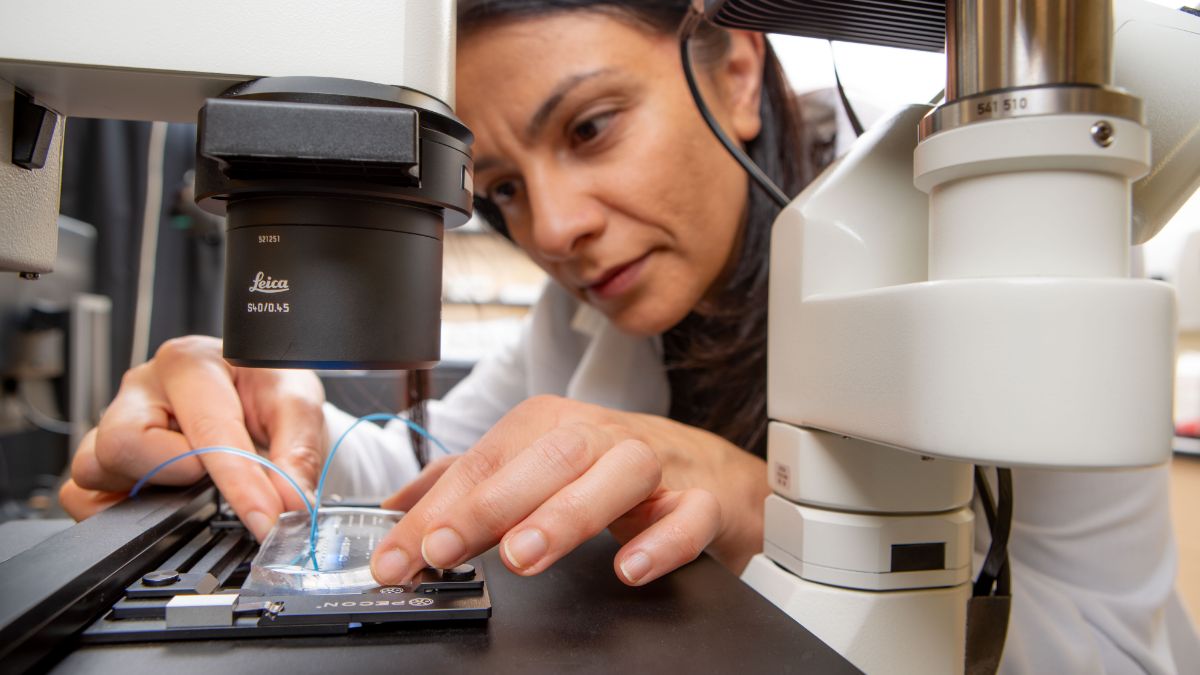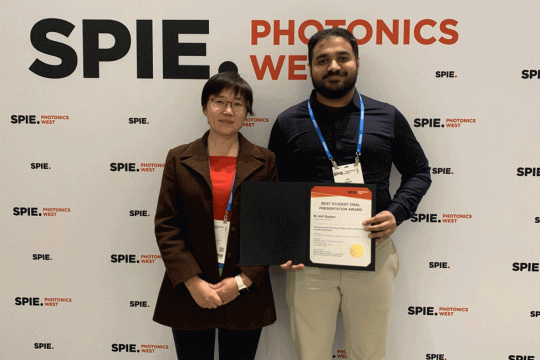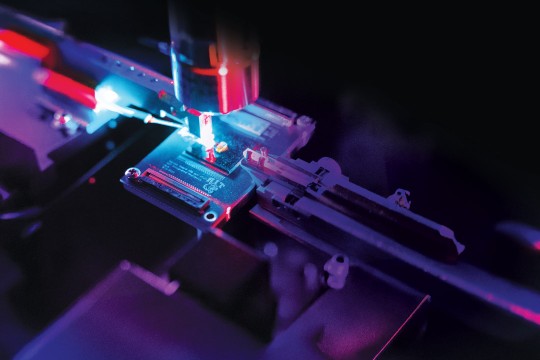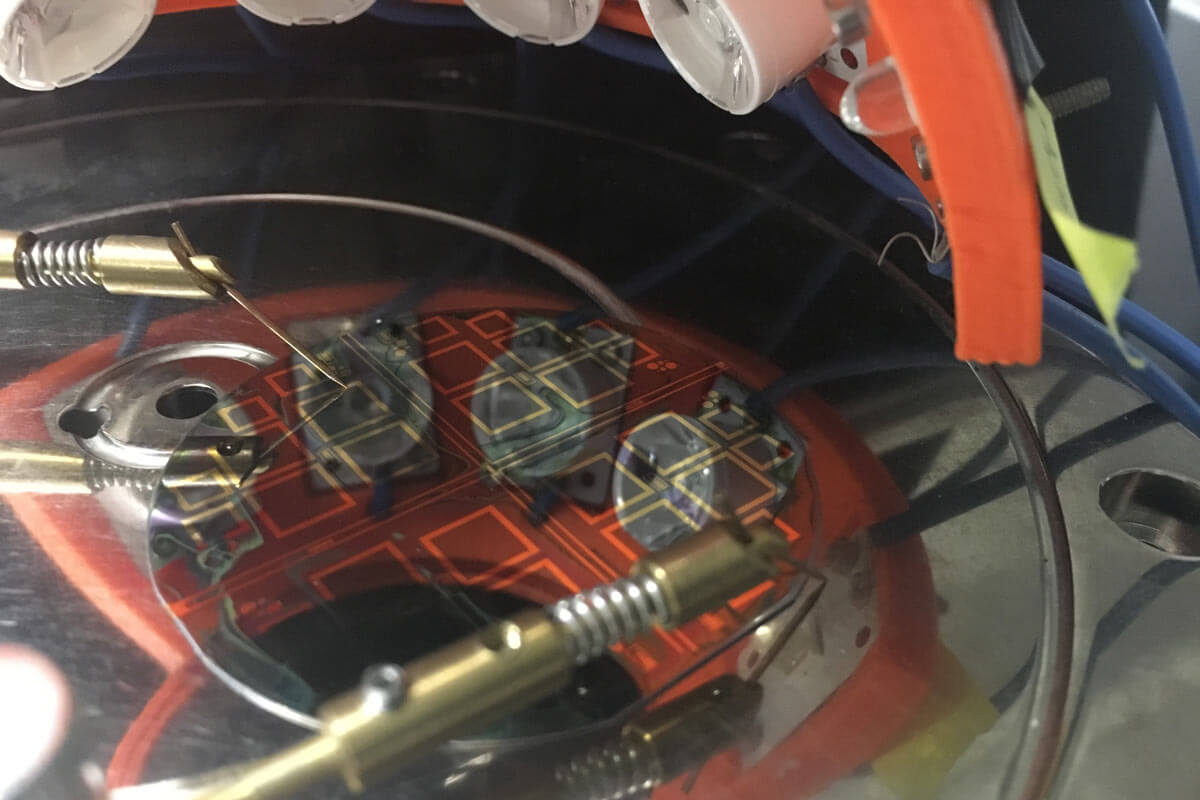Physics Bachelor of Science Degree

Physics
Bachelor of Science Degree
- RIT /
- Rochester Institute of Technology /
- Academics /
- Physics BS
Explore the laws of matter and energy while mastering physics concepts that explain the universe, power innovation, and matter and energy.
Overview for Physics BS
Why Pursue a Physics Degree at RIT
Participate in paid cooperative education and hands-on research experiences at organizations such as NASA, the National Institutes of Standards and Technology, Idaho National Laboratory, and NASA's Jet Propulsion Laboratory.
Undergraduate research in physics includes astrophysics, quantum optics, gravitational wave physics, biophysics, and the physics of materials.
Access 14 research labs and centers, including the Center for Computational Relativity and Gravitation and the RIT Observatory.
RIT's physics major is recognized by the American Physical Society for Improving Undergraduate Physics Education, which includes an active-learning workshop format for early year classes.
Accelerated Bachelor’s/Master’s Available: Earn both your bachelor’s and your master’s in less time and with a cost savings, giving you a competitive advantage in your field.
STEM-OPT Visa Eligible: The STEM Optional Practical Training (OPT) program allows full-time, on-campus international students on an F-1 student visa to stay and work in the U.S. for up to three years after graduation.
The world of physics is dynamic. Some physicists use principles in theoretical areas, such as the nature of time and the origin of the universe; others apply their physics knowledge to practical areas such as the development of advanced materials, electronic and optical devices, and medical equipment. They often design and perform science-based experiments, using sophisticated equipment, and then attempt to draw useful conclusions from their observations/analysis.
RIT’s Bachelor’s Degree in Physics
RIT’s physics degree gives you a solid foundation in experimental, computational, and theoretical physics, as it fosters your analytical and problem-solving skills. The curriculum emphasizes laboratory training as you explore the basic principles governing the structure and behavior of matter, the generation and transfer of energy, and the interactions between energy and matter. The hands-on experience you gain prepares you for graduate school or for direct entry into a professional career.
Physics Courses
Studying physics at RIT begins with mathematics, science, and liberal arts courses covering the breadth of the discipline from condensed matter to cosmology. In the third or fourth years, advanced topics are introduced such as statistical physics and quantum mechanics.
You’ll have a range of physics electives to choose from, that can help tailor your physics degrees toward your professional goals. You’ll also participate in advanced laboratory work and in your final year you’ll complete a required capstone project. You’ll also have opportunities to participate in faculty-led research projects and cooperative education–full-time, paid work experience in the field–is highly encouraged.
Enhance Your Physics Degree with a Minor or Immersion
RIT’s 185+ minors and immersions offer you an opportunity to pair your physics major with a range of topics that can enhance your studies, provide a deeper understanding of a sub-topic of physics (such as astronomy, imaging science, mechanical engineering, optical science, or quantum information science and technology, to name a few), or allow you to explore a personal area of interest.
Furthering Your Career in Physics
Today’s careers require advanced degrees grounded in real-world experience. RIT’s Combined Accelerated Bachelor’s/Master’s Degrees enable you to earn both a bachelor’s and a master’s degree in as little as five years of study, all while gaining the valuable hands-on experience that comes from co-ops, internships, research, study abroad, and more.
Combined Accelerated Bachelor’s/Master’s degrees are available where you can pair your physics bachelor's degree with a range of master’s degree options, including:
- Physics BS/Astrophysical Sciences and Technology MS: This accelerated dual-degree provides a foundational understanding in the broad field of physics and adds advanced studies in astrophysics. Start with the physics BS, which establishes the basic principles of physics through an active-learning curriculum and hands-on opportunities. Further your knowledge with a master’s degree in astrophysical sciences and technology and customize your degree with the track of courses that aligns with your professional aspirations. With three associated research centers, you’ll have access to world-class research mentors and interdisciplinary research projects. This pathway provides a stepping stone to a Ph.D. or prepares you for careers in education, companies in the STEM sector, and government agencies such as the National Radio Astronomy Observatory and NASA.
- Physics BS/Materials Science and Engineering MS: Combine your BS degree in physics with an MS in materials science and engineering to become a leading professional in the interactions of matter, materials, and energy. With an undergraduate curriculum spanning experimental, computational, and theoretical physics, you’ll explore a variety of fields and use electives to tailor your degree to your career goals. During the master’s degree, you will further specialize your training with the addition of interdisciplinary engineering principles and a robust research thesis. The applied research aspect of the master's degree program gives you extensive experience in independent thinking, project management, and leadership, preparing you for exciting careers at top companies.
- Physics BS/Physics MS: Pursue a rewarding career in the field of physics with this combined accelerated dual degree. You’ll start by developing a strong foundation in experimental, computational, and theoretical physics with many opportunities to solidify your knowledge with hands-on experiences like research, co-ops, and internships. Moving into the master’s program will deepen your knowledge in core areas while also developing the professional skills that employers are seeking. The program’s flexible design allows you to customize your degree so you can achieve your career goals in the field that interests you. Your access to extensive labs, equipment, and research-active mentors will prepare you for a wide range of exciting opportunities at companies across all economic sectors.
- Physics BS/Science, Technology, and Public Policy MS: This accelerated dual degree combines a foundation in physics with advanced study in applied public policy, equipping grads to be global leaders in shaping policies of the future for clean energy, artificial intelligence, technology innovation strategy, and other emerging innovations. The physics BS program builds expertise in core physics principles and provides the flexibility to focus on special interest areas through elective course selections, while the MS program develops expertise in policy analysis and implementation. This cross-disciplinary approach builds skills in collaborative problem solving, critical thinking, and communication that give grads an advantage in tackling some of the world’s most pressing challenges.
- Physics BS/Sustainable Systems MS: The physics BS degree prepares students well for MS-level work in sustainable systems and subsequent career opportunities in the field. The undergraduate physics curriculum provides a strong scientific background, quantitative problem-solving skills, and the training to think critically. This foundation will prepare you to understand and contribute to emerging sustainable systems and technologies as you transition to the MS program.
- +1 MBA: Students who enroll in a qualifying undergraduate degree have the opportunity to add an MBA to their bachelor’s degree after their first year of study, depending on their program. Learn how the +1 MBA can accelerate your learning and position you for success.
-
Join Us for Accepted Student Open House
Visit campus on March 28 or April 11 to meet faculty, tour campus, and ask your questions.
-
Join us for Fall 2026
There's still time to apply. For some programs, applications will be reviewed on a rolling, space-available basis.
Careers and Cooperative Education
Typical Job Titles
| Optical Engineer | Scientific Software Developer | Instrumentation Scientist |
| Radiation Scientist | Quantum Technology R&D | Planetarium Presenter |
| Aerospace Engineer | Satellite Systems Scientist | Power Plant Nuclear Operator |
| Data Analyst | High School Physics Teacher |
Industries
-
Aerospace
-
Government (Local, State, Federal)
-
Scientific and Technical Consulting
-
Higher Education
-
Internet and Software
-
Research
Cooperative Education
What’s different about an RIT education? It’s the career experience you gain by completing cooperative education and internships with top companies in every single industry. You’ll earn more than a degree. You’ll gain real-world career experience that sets you apart. It’s exposure–early and often–to a variety of professional work environments, career paths, and industries.
Co-op is optional but strongly encouraged for students in the physics degree.
Careers in Physics
Graduates with a BS degree in physics are sought after and highly employable in both the private and public sectors. They typically find positions in industry, government agencies and labs, and teaching. Many graduates choose to continue their education in doctoral or master's programs in physics or physics-related areas such as astrophysics, applied physics, biophysics, geophysics, atmospheric science, imaging science, and engineering. Students also are well-prepared for entry into medical, law, or business school.
Featured Work and Profiles
-
From Personal Battle to Planetary Impact: Ph.D. Student Tackles Agricultural Plastics
Backed by a $15 million NSF grant, Katie Malarkey ’04 (physics), a sustainability Ph.D. student, quantifies the volume of plastics and tackles their end-of-life issues.
Read More about From Personal Battle to Planetary Impact: Ph.D. Student Tackles Agricultural Plastics -
From RIT and Cornell to Co-founder of Kanvas Biosciences
After studying physics at RIT and Cornell, Hao Shi ’13 now uses his quantitative skills as co-founder and CTO of Kanvas Biosciences, a company dedicated to developing innovative live biotherapeutics.
Read More about From RIT and Cornell to Co-founder of Kanvas Biosciences -
Explore Undergraduate Research, Discover a Passion, Land a Career
Tyler Godat ’16 chose RIT because of its reputation for undergraduate research, co-ops, and internships. Now, he is an optical measurements engineer at Corning.
Read More about Explore Undergraduate Research, Discover a Passion, Land a Career -
Graduate Student at the Intersection of Biology, Medicine, and Physics
Support from faculty combined with research opportunities helped Lucas Berens gain the experience and knowledge he needed to excel at graduate school and pursue his dream of becoming a physicist.
Read More about Graduate Student at the Intersection of Biology, Medicine, and Physics
Curriculum for 2025-2026 for Physics BS
Current Students: See Curriculum Requirements
Admissions and Financial Aid
This program is STEM designated when studying on campus and full time.
First-Year Admission
First-year applicants are expected to demonstrate a strong academic background that includes:
- 4 years of English
- 3 years of social studies and/or history
- 4 years of mathematics is required and must include algebra, geometry, algebra 2/trigonometry, and pre-calculus. Calculus is preferred.
- 3 years of science is required and must include physics.
Transfer Admission
Transfer applicants should meet these minimum degree-specific requirements:
- A minimum of college algebra is required. Pre-calculus or calculus is preferred.
- Chemistry is required.
Financial Aid and Scholarships
100% of all incoming first-year and transfer students receive aid.
RIT’s personalized and comprehensive financial aid program includes scholarships, grants, loans, and campus employment programs. When all these are put to work, your actual cost may be much lower than the published estimated cost of attendance.
Learn more about financial aid and scholarships
Accreditation
Research
Undergraduate Physics Research Opportunities
Many undergraduate physics majors join research labs and engage in research starting as early as their first year. Participation in undergraduate physics research leads to the development of real-world skills, enhanced problem-solving techniques, and broader career opportunities. Students have opportunities to travel to national conferences for presentations and also become contributing authors on peer-reviewed manuscripts. Explore RIT's physics undergraduate research.
Related News
-
February 18, 2026

Ph.D. student recognized for work in optics
Imaging science Ph.D. student Muhammad Akif Qadeer has been awarded the 2025 Harvey M. Pollicove Memorial Scholarship from the Optica Foundation. The award is given to one student each year who shows potential in precision optics manufacturing and lens design.
-
December 19, 2025

University launches multidisciplinary training program to strengthen the U.S. semiconductor workforce
RIT has launched CMOS+X, a National Science Foundation Research Traineeship program that prepares future STEM leaders with professional skills training, including interdisciplinary collaboration, scientific writing, strategic communication, and project management skills.
-
November 19, 2025

Manifesting quantum: How RIT researchers are navigating the next frontier of physics
RIT researchers are zeroing in on quantum photonics, the creation, control, and detection of light. Photonics has long been a specialty of the university. RIT led the team that developed the first quantum photonic wafer, which is key to the future of mass-produced quantum communication systems.
Contact
- Dawn Hollenbeck
- Associate Professor, Physics
- School of Physics and Astronomy
- College of Science
- 585‑475‑6652
- dmhsps@rit.edu
School of Physics and Astronomy



















